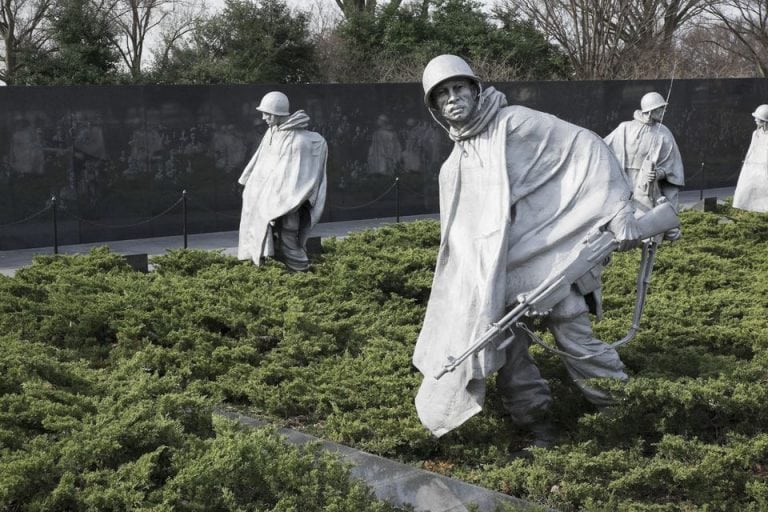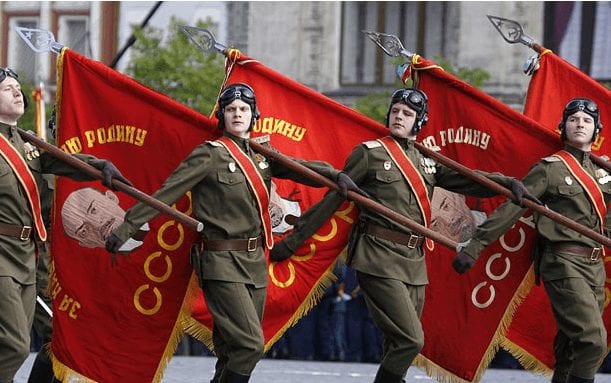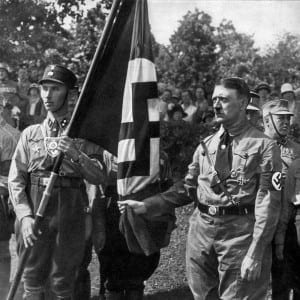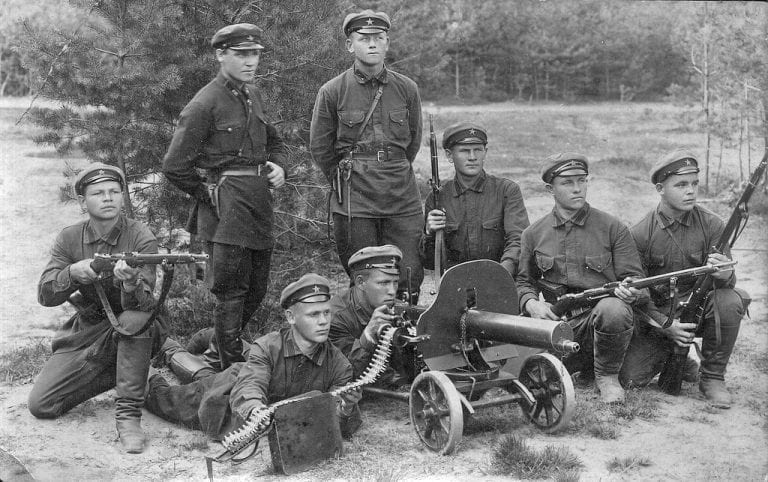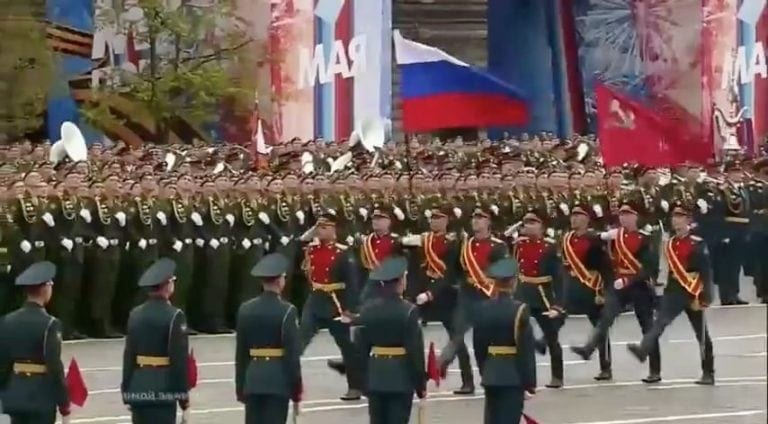Russian Historiography of the Korean War
The history of the Korean War is not written only in English. It is also told, recorded and written in Korean, Chinese and Russian – and the languages of other participants in this monstrous and mostly ‘forgotten’ war.
One of its most controversial and still unresolved issues are accusations – made in February 1951, by North Korea, China and the Soviet Union at the United Nations – that the U.S. engaged in bacteriological warfare (BW) in Korea.
These accusations were and still are denied by the U.S. (and Allies) and dismissed as ‘Communist propaganda’ or a ‘hoax.’
The ‘denialist’ camp is led by Milton Leitenberg of the Woodrow Wilson Centre and his associates. His original refutations are based on 12 secret Soviet ‘documents’, allegedly copied from the Russian President’s Archive in Moscow by a person employed there and handed over to Japanese journalist, Yasuo Naito.
Mr. Naito first disclosed his ‘findings’ in an article titled The Use of Bacteriological Weapons by U.S. Forces During the Korean War Was Fabrication by China and Korea: Uncovered by Classified Documents of the Former Soviet Union (Sankei Shinbum, Jan. 8, 1998.) He is currently the chief editor of Japan Forward which claims that South Korean Wartime Sex Slaves is ‘Fake News’ (Japan Forward, Apr. 5, 2017.)
When he published his ‘revelations,’ Mr Naito was the Moscow correspondent of the right-wing newspaper Sankei Shinbum. An article in the current issue of Japan Focus reveals the role Sankei Shinbum plays in Japan’s ‘history wars’ as a platform for denying Japan’s criminal record in Korea, China and elsewhere and denouncing peace activists and critics of Japan’s militarist drift as ‘communists’ and ‘anti-Japan’.
According to Naito and Leitenberg, the 12 Soviet ‘documents’ prove that germ warfare was a ‘hoax’ concocted and coordinated by Stalin, Mao and Kim Il Sung to embarrass the U.S. and Allies in the eyes of world public opinion. (Milton Leitenberg, New Russian Evidence on the Korean War Biological Warfare Allegations: Background and Analysis, University of Maryland, December 1998.)
Stephen Endicott and Edward Hagerman have written a meticulously researched book on bacteriological warfare: The United States And Bacteriological Warfare, Secrets from the early Cold War and Korea(Indiana University Press, 1998). They have also written a detailed response to Leitenberg’s ‘revelations’: Twelve Newly Released Soviet-era ‘Documents’ and allegations of U.S. germ warfare during the Korean War.
The article begins:
“In 1998 a Japanese journalist from the Tokyo newspaper, Sankei Shimbun, found or was given eleven documents of 1953 and one of 1952 from the Presidential Archives in Moscow which he claimed showed that the Chinese and North Korean charges that the United States used biological weapons in the Korean War were fabricated and fraudulent. (…)
“The documents are not the kind of evidence upon which scholarly research is usually based. In this case the original source is not disclosed, the name of the collection is not identified, nor is there a volume number which would allow other scholars to locate and check the documents. They are not photocopies, but only hand-written copies or notes purportedly taken from the originals. (When these issues are clarified it may be time to remove the quotation marks surrounding these ‘documents.’) Further questions about motives in transferring documents are raised because they were obtained from an unidentified source and given to a journalist for a right-wing Japanese newspaper. Nevertheless, as translated into English by Kathryn Weathersby of the Cold War International History Project of the Woodrow Wilson Center in Washington, and published by Milton Leitenberg in The Korean War Biological Warfare Allegations Resolved,(40 pg. pamphlet, Stockholm, May 1998), they have become fodder for sensationalist journalistic articles as well as the subject of analysis and interpretation by Western historians.” (See also Endecott and Hagerman’s, On Wuzhili’s ‘false alarm‘.)
But what do Russians say, write, think about the war in Korea? Since I speak and read Russian, I decided to do an online search in Russian and see what would come up. So here are some of my findings…
In the U.S., Australia and other countries that fought in Korea under U.S. command, the Korean War is known as the ‘forgotten war.’ In the Soviet Union – now ex-Soviet Union – it was and is known as the ‘secret war.’ The USSR was allied with North Korea and China, but did not officially participate in military operations. But in fact, it did, secretly. The Soviet Union sent military advisors, pilots and airplanes, air-defense units, radio operators and other supporting personnel and equipment to Korea, and they did take part in military actions.
According to the article Soviet Pilots in Korean Skies, Soviet aircrews were first deployed to bases in China in August 1951 and in North Korea in 1952. In November 1952, there were 441 pilots and 321 airplanes. The new MIG-15 proved extremely effective in aerial combat.
“During the period of combat operations, Soviet pilots conducted 19,203 sorties. … From November 1950 to January 1952, 564 enemy aircraft were shot down in air battles. Soviet losses for the same time were: 34 pilots and 71 aircraft. Soviet aviation and antiaircraft artillery disrupted enemy air strikes, dispersing its combat orders and reducing the accuracy of bombing.”
12 April 1951 would be remembered as Black Thursday by the U.S. Air Force according to this article in Zvezda.
“On that day, 28 B-29 American bombers took off, covered by 80 jet fighters. 48 MiG-15 were sent to intercept them and all of them returned to base after the battle. The enemy’s losses were: ten B-29 bombers shot down and 15 were hit. Some 120 airmen were captured. This day went down in the history of American aviation as ‘Black Thursday’.
“The total loss of aviation during the Korean War amounted to 319 MiG-15 aircraft from the Soviet side and 1,097 bombers and fighters from the US.
“The war in Korea made it clear to the American military what force they would have to face in the event of an attempt to attack the Soviet Union.”
Experts will no doubt dispute these figures, but they certainly dispel the myth – partly protected by Soviet secrecy – of total American air superiority in Korea. I believe it is an important point.
Another article deals with bacteriological warfare. It is written by a biologist, Mikhail Supotnitskiy. He presents in great detail the various delivery methods of bacteriological agents used by the U.S. in Korea, many of them devised by Japan’s infamous Unit 731 and adopted by the Americans.
According to Supotnitskiy, by 1951, the U.S. and Allies had lost their air supremacy, the war turned static, with the North Korean and Chinese dug deep underground or sheltering in caves and tunnels. Korea is a mountainous country – especially the North – so there was no lack of comfortable places to hide from U.S. bombs.
Napalm was ineffective against well dug-in troops and chemical attacks risked provoking a North Korean-Chinese riposte – the Japanese had left plenty of deadly chemical stockpiles from World War 2 and the Sino-Japanese war.
So let’s try to sketch the situation in late 1951, early 1952. The two sides were facing each other in mostly static battle positions along the 38th Parallel, where the war had started in July 1950. The U.S. had lost its nuclear monopoly in 1949, when the USSR successfully tested its first nuclear bomb. By then, the U.S. had also lost its initial supremacy in the air to the combined Soviet, Chinese and North Korean air forces. U.S. Command could not have been pleased with this situation. This was the first armed conflict of the nuclear age – and of the Cold War – and the United States were not winning it as expected, and by military and divine might.
The U.S. had been pursuing an active biological warfare program since 1942. After Japan’s defeat in 1945, the American absorbed the more advanced Japanese BW research and began an accelerated development program at Fort Detrick, Maryland and other secret facilities. They had already conducted secret tests by spraying anthrax over San Francisco Bay, in Alaska and elsewhere. (As revealed in the German documentary Codename Artichoke.) Now they had to test them in real war conditions, on ‘gooks’ and ‘reds’ that stubbornly refused yield to conventional military force and the natural superiority of the God-Fearing White Christian Man. (If you want to learn how deeply and fundamentally racist the Korean War was, read Bruce Cumings’ excellent The Korean War.)
According to Supotnitskiy, dropping a few rats with plague-bacteria-infected fleas, contaminated feathers, disease-carrying insects etc. into caves and tunnels where ‘red rats’ were hiding was very tempting and effective, both on an experimental and operational level.
Another useful Russian document is Russian Historiography of the Korean War compiled by historian Yuri Vanin (1930-2017). It is a detailed survey of Soviet and post-Soviet historical scholarship on the Korean war. It is interesting to learn how many historians in Russia (and China) changed their tune when the political wind shifted and started blowing Westward. From supporting – with reservations – North Korea in Soviet times, they turned – some virulently – against it and began toeing the Western line of blaming Stalin (mostly), Mao and Kim Il Sung for everything – including germ warfare. But the 1990’s were a confusing time in Russia, following the collapse of the Soviet Union and Soviet society in general – including its academic institutions, libraries, archives and so on.
Vanin also writes that in 1994 the Archive of the President of the Russian Federation relating to the Korean War was donated to the Republic of Korea (South Korea). That is the very same archive from which Naito and Leitenberg’s 12 Soviet ‘documents’ originated in 1998, allegedly copied by an unknown archivist. Interesting…
Another important document in Russian is the full transcript of the Khabarovsk Trials. It is 538 pages long. That’s how it begins:
“From 25 to 30 December in the city of Khabarovsk, a trial was held in the case of twelve former officers of the Japanese army accused of preparing and using bacteriological weapons.”
These “former officers” belonged to Unit 731. While many of the worst Japanese war criminals were tried and sentenced to death by a U.S. Military Court in Tokyo, the leader of Unit 731, General Shiro Ishii, and his top aides, were granted immunity and asked to work on the U.S. BW research and development program.
If you want to read a point-by-point exposé of Japanese war crimes in English (170 pages) it is available here. Or you can watch the BBC documentary, Unit 731, Japan’s biological force.
My father, journalist Wilfred Burchett, had read the Khabarovsk Trial transcript when he was in China in 1951. He was also at a press conference in Chungking in late November 1941 at which Kuomintang China’s chief official spokesman, Dr Tsiang Ting-fu, accused the Japanese of having dropped infected fleas in the Changde district of Hunan province, causing an epidemic of bubonic plague in an area where it had previously been unknown. (The above mentioned BBC documentary investigates this.)
So when the North Koreans and Chinese made their accusations against the U.S. in February 1952, he had every reason to believe the allegations, investigate them and report them to the world.
One month after the U.S. dropped the atomic bomb on Hiroshima, he wrote from the city’s still smoking ruins:
“In Hiroshima, 30 days after the first atomic bomb destroyed the city and shook the world, people are still dying, mysteriously and horribly – people who were uninjured by the cataclysm – from an unknown something which I can only describe as atomic plague.”
His eye-witness report was dismissed by the U.S. Military authorities as ‘Japanese propaganda’ and they tried to have him expelled from Japan. His Contax camera with his photos from Hiroshima mysteriously disappeared…
To this day, Wilfred Burchett is accused of having ‘fabricated’ the germ warfare ‘hoax’ – one of his many ‘sins.’ (See my Dirty Secrets of the Korean War, CounterPunch, Jan. 26, 2018.)
At least Naito-Leitenberg’s 12 Soviet ‘documents’ dispel that myth. According to them, the germ warfare ‘pranksters’ were Stalin, Mao and Kim Il Sung.
The evidence that the U.S. – and Japan – engaged in bacteriological warfare in Korea and China is overwhelming and conclusive – even if in the case of the U.S.A. a ‘smoking gun’ hasn’t been produced yet. And likely never will be.
12 suspicious Soviet ‘documents’ surreptitiously copied from an archive displaced from its original location into ‘enemy territory’ (North and South Korea are still technically at war – as we are reminded almost every day) cannot outweigh the compiled evidence of American guilt. Including the extensive and detailed evidence collected by the International Scientific Commission for the Investigation of the Facts concerning Bacterial Warfare in Korea and China, led by Professor Joseph Needham of Cambridge University – one of Great Britain’s most eminent scientists and scholars. The International Scientific Commission’s finding were also dismissed as ‘communist propaganda’ and its distinguished members denounced as ‘dupes’ and ‘useful idiots.’
The ‘deniers’ are supported by a huge and mighty propaganda machine that serves the military-industrial complex, with its armies of enforcers, intelligence agencies, scribes, scholars, institutes, think tanks etc.
I detect a sickeningly familiar pattern here. I remember headlines like Comrade Burchett was a party hack (Peter Kelly, The Australian, Jan.7, 2006) or ‘Case closed’ as Soviet archives prove Wilfred Burchett was KGB (Robert Manne, The Australian, July 26, 2013) – to quote only two in a long and sustained stream of slanderous hatchet jobs in the Australian media. They all have one thing in common: they are almost always based on some newly discovered ‘document’ in some Soviet or former Soviet-satellite ‘archive,’ or ‘revelations’ by some ‘defector,’ and are triumphantly trumpeted in print, on the airwaves etc. as the latest ‘proof’ of Burchett’s ‘communist treachery.’
The people who write this stuff rarely, if ever, visit battlefields; they don’t see corpses and blood, smoking ruins, devastated landscapes, poisoned environments… They dwell in plush offices, editorial rooms, universities, ‘institutes’, think tanks etc., dig dirt on others, quote selectively and out of context, refer to each other’s ‘findings’, ‘discoveries’ etc. and write long pompous essays that are lauded and promoted by their media and other cronies as THE TRUTH (usually divorced from facts – we have to accept it on ‘faith,’ for they are privy to ‘information’ not available to the hoi poloi…) When their ‘truth’ turns out to be an un-truth, they are nonplussed, they just create another ‘truth.’ Truth is fun because they don’t have to look it in the eyes, or face the victims of their ‘truth’ or those on the receiving end of their ‘revelations’ and ‘allegations.’
These ‘truth-promoters,’ or gate-keepers, are usually polite, well-spoken, mild-mannered, well-dressed, well-groomed, they drink fine wines rather than whisky… They will denounce the crimes of Hitler, Stalin, Mao and so on with restrained conviction to cover up their own – or rather their paymasters’ past and present crimes. Shall we enumerate the countries invaded and devastated since Korea, in the name of ‘Freedom & Democracy,’ the twin guarantors of ‘Truth’ – as opposed to her nemesis ‘Propaganda’? Historian William Blum provides an extensive list in Killing Hope: U.S. Military and C.I.A. Interventions Since World War II – Updated Through 2003. (It needs updating.)
For the plush institutional ‘truth-seekers,’ ‘truth’ has a BBC accent or is delivered by CNN star reporters with meaningful frowns. Russian, Chinese and Korean are the languages of ‘communist propaganda’ or whatever narrative is currently disapproved of.
But I believe people around the world are beginning to see through the smokescreens and lies, they can see through the fog of war.
People are getting sick and tired of endless wars based on dodgy ‘dossiers’, lies, deception and media manipulations.
So kicking that old can of germs from the Korean War until the lid eventually comes off and spills its dark secrets is not a waste of time.
I am grateful to Russian historians and scholars for adding a few more elements to the compelling body of evidence of American – and Japanese – war crimes in Korea.
Including germ warfare.
For, as Bob Dylan sings:
Come, you masters of war
You that build the big guns
You that build the death planes
You that build all the bombs
You that hide behind walls
You that hide behind desks
I just want you to know
I can see through your masks…

This work is licensed under a Creative Commons Attribution-NonCommercial 4.0 International License

